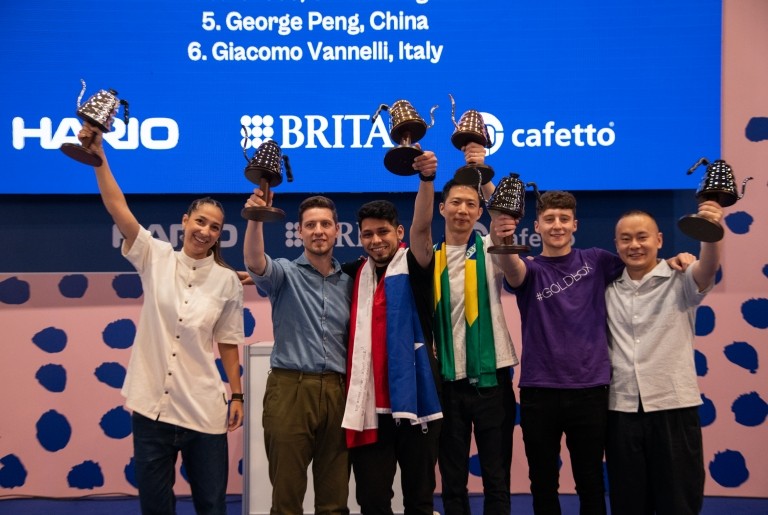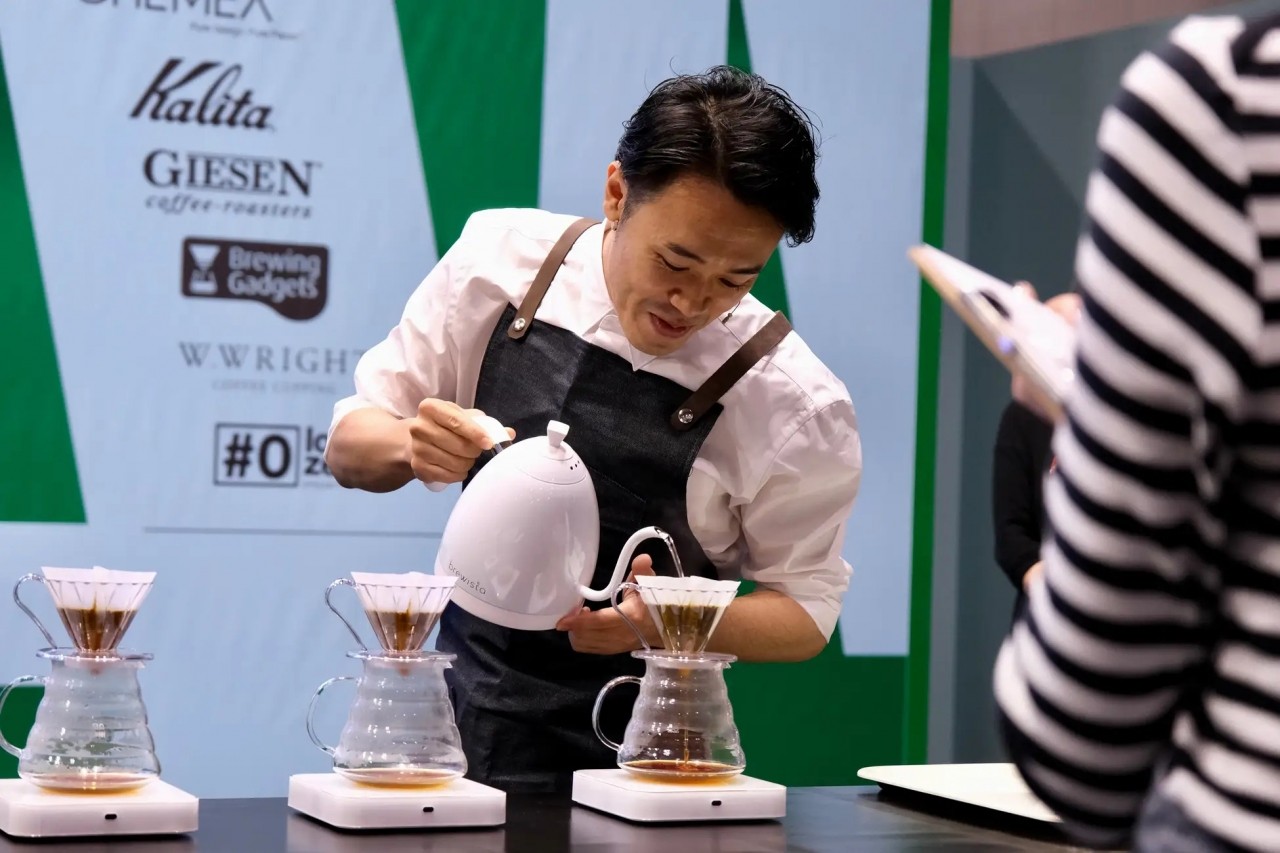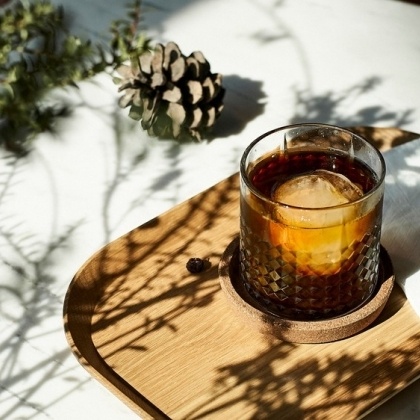Japan Brewers Cup (JBrC) champion Hikaru Ono joined CROWD ROASTER as a roaster.
This time we will introduce this tournament and the World Brewers Cup (WBrC), which is a world tournament.
This time we will introduce this tournament and the World Brewers Cup (WBrC), which is a world tournament.

“JBrC” is a domestic competition to select representatives for the world competition.
The Japan Brewers Cup (JBrC) is a domestic coffee brewing competition that has been held since 2014. The Japan Hand Drip Championship (JHDC), which specializes in paper flannel drip, was already held in Japan, but this competition was created as a domestic competition for the World Brewers Cup (WBrC), which allowed the use of a wider variety of brewing equipment. The tournament has started.
The JBrC winner will be given the right to participate in the WBrC as a representative of Japan.
The JBrC winner will be given the right to participate in the WBrC as a representative of Japan.
WBrC, a world competition for black coffee extraction
WBrC is a competition that has been held every year since 2011. The event is held in conjunction with the World Barista Championship (WBC) and World Coffee Roast Championship (WCRC), and is also sponsored by World Coffee Events.
The World Brewers Cup does not require any mechanical power, such as an espresso machine, and only manual equipment such as paper drips, flannel drips, French presses, and Aeropresses can be used.
Because this is a competition in which contestants choose their own extraction techniques and compete, the resulting coffee tastes vary widely. The contestants' individuality and ingenuity will be tested, as well as their technique and knowledge, to determine how to bring out the charm of coffee.
The World Brewers Cup does not require any mechanical power, such as an espresso machine, and only manual equipment such as paper drips, flannel drips, French presses, and Aeropresses can be used.
Because this is a competition in which contestants choose their own extraction techniques and compete, the resulting coffee tastes vary widely. The contestants' individuality and ingenuity will be tested, as well as their technique and knowledge, to determine how to bring out the charm of coffee.
Hikaru Ono who participated in WBrC as a representative of Japan in 2022
Simply put, this competition pits the taste of hand-brewed black coffee against each other.
Contestants not only select equipment and coffee (blends are also available), but also finely adjust various elements such as water with adjusted minerals called custom water, control of the particle size and fine powder of ground beans, etc. We aim to reach the top with the best black coffee we produce.
What is the content of the competition?
The World Brewers Cup qualifying round will consist of two competitions: compulsory service and open service, while the final will consist of only open service.
In both cases, you may bring in any equipment you will use for the competition, such as a grinder for grinding coffee beans, brewing equipment, and cups.
As mentioned above, the extraction equipment must be manual, and the selection is one of the uniqueness of the contestant.
The only requirement for coffee is that it must have a TDS of less than 2% to distinguish it from espresso.
TDS (Total Dissolved Solid) is a numerical value that indicates the concentration of coffee components contained in extracted coffee. Espresso has a TDS of nearly 10%, but the TDS for regular drip coffee as determined by the Specialty Coffee Association is 1.15 to 1.35%.
In both cases, you may bring in any equipment you will use for the competition, such as a grinder for grinding coffee beans, brewing equipment, and cups.
As mentioned above, the extraction equipment must be manual, and the selection is one of the uniqueness of the contestant.
The only requirement for coffee is that it must have a TDS of less than 2% to distinguish it from espresso.
TDS (Total Dissolved Solid) is a numerical value that indicates the concentration of coffee components contained in extracted coffee. Espresso has a TDS of nearly 10%, but the TDS for regular drip coffee as determined by the Specialty Coffee Association is 1.15 to 1.35%.
Mandatory and open services
In the compulsory service, three cups of coffee will be prepared for the judges using coffee beans provided by the competition organizers. It is evaluated based on aroma, flavor, aftertaste, acidity, body, balance, etc., and is aggregated with a score out of 100.
In the case of open service, contestants are given presentation time in addition to brewing their own choice of coffee beans. Presentations that explain the origin of coffee beans, extraction methods, tasting notes, etc. will also be scored, and open services will be totaled out of 140 points.
The six players who passed the preliminary rounds will advance to the final round, where competition will be held only with open service, and the player with the highest score will be the champion.
In the case of open service, contestants are given presentation time in addition to brewing their own choice of coffee beans. Presentations that explain the origin of coffee beans, extraction methods, tasting notes, etc. will also be scored, and open services will be totaled out of 140 points.
The six players who passed the preliminary rounds will advance to the final round, where competition will be held only with open service, and the player with the highest score will be the champion.
What are the rules at JBrC?
Competitions in Japan will also be held in accordance with WBrC rules. The competition consists of a qualifying competition and a semi-final/final competition. As a compulsory service in the qualifying competition, contestants use officially roasted beans and are judged purely on taste.
Additionally, in the semi-final/final competition, each contestant will bring their own roasted beans as an open service, and will showcase the appeal of their beans through extraction techniques and presentations.
Please note that the rules have been revised for both the World and Japan tournaments, so please check the latest information.
Additionally, in the semi-final/final competition, each contestant will bring their own roasted beans as an open service, and will showcase the appeal of their beans through extraction techniques and presentations.
Please note that the rules have been revised for both the World and Japan tournaments, so please check the latest information.

At WBrC, the success of Japanese baristas is also noticeable. In 2016, Tetsu Kasuya became the first Asian champion. In 2021, Daiki Hatakeyama took second place.
We will continue to pay close attention to the tournament, hoping for the success of Japanese athletes.
We would also like to deliver content in which Hikaru Ono introduces the trends of the world championships.
looking forward to!
2023.8.26
CRWD ROASTER
2023.8.26
CRWD ROASTER


